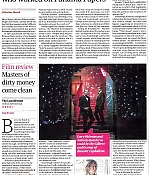|
Simply Streep is your premiere source on Meryl Streep's work on film, television and in the theatre - a career that has won her the praise to be one of the world's greatest working actresses. Created in 1999, we have built an extensive collection to discover Miss Streep's body of work through articles, photos and videos. Enjoy your stay.
|
Celebrating
25 years
of SimplyStreep
|
|
Review: Streep pays tribute to journalists who worked on Panama Papers
The Guardian ·
September 02, 2019
· Written by Xan Brooks
|
Bow your heads in remembrance of Mossack Fonseca, the best law firm you never heard of, the world’s fourth largest provider of offshore financial services. For decades it operated quietly, diligently under the radar of public scrutiny, shepherding its anxious clients through a mystifying array of global tax evasion schemes until the release of the Panama Papers in 2016 metaphorically pissed on everyone’s chips. Next thing you know, the office has been raided, its directors are in jail and the golden age is over, or at least under audit.
Now the culprits are back to give their side of the story via the medium of Steven Soderbergh’s The Laundromat, a whip-smart, fiendishly entertaining contender at this year’s Venice film festival. As impersonated by Gary Oldman and Antonio Banderas, Jurgen Mossack and Ramon Fonseca amble about in posh tuxedos or brocaded smoking jackets, clutching dry martinis and speaking directly to camera. They could be obsequious waiters or mischievous performance artists, the Gilbert and George of disaster capitalism. They’re here to tell us all about “the secret life of money”, about futures and equities and the proliferation of shell companies that can be used to hide billions.
“That’s the story? Empty shells?” snorts an unimpressed journalist and she may well have a point because judged at face value, the subject’s dry as dust. All the same, The Laundromat – “based on actual secrets” and adapted from a non-fiction book by Jake Bernstein – does a fine job in making a drama out of this financial crisis. Soderbergh (whose CV includes films such as Traffic, Side Effects and Erin Brockovich) understands the importance of putting human faces to dry statistics. He reveals how the tentacles of financial misrule eventually extend to touch honest-to-God human lives.
Mossack and Fonseca prize discretion above all things, except possibly money. Naturally, they would “prefer not to know” about the sometimes shady provenance of the clients on their books. The drug kingpins and sex traffickers. The traders in human organs. But happily Soderbergh has no such qualms. So he throws in the tale of a murder inside a business hotel and another about a philandering businessman who buys his daughter’s silence with inflated share options. These case studies are presented with a twinkle of good humour. They play like jaunty little sitcoms but carry the distinct whiff of sulphur.
The film’s prize asset, though, is Meryl Streep, playing the role of Ellen Martin, an elderly widow on the trail of her late husband’s insurer. Ellen chases the paper trail from one shell company to the next, determined to hold someone to account, until she finally finds an address for the corporation’s head office. This turns out to be a safety deposit box on the seafront out in Nevis.
“Now is the time for action,” vows Ellen, which is all well and good. But viewers hoping for a Hollywood happy ending or even a clear-cut resolution won’t find it here. The film’s too astute and the situation’s too parlous. Earnestly, helpfully, Mossack and Fonseca explain that in fact they are just the tip of the iceberg and that this particular ship has already sailed. Lined up behind them are row upon row of unprepossessing grey men in business suits, sitting behind desks, mainly thinking about lunch. Everyone’s compromised, everyone’s implicated. The machine’s wholly broken. Everything comes out dirty.
The Laundromat is released on 27 September










